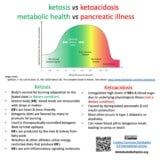Why write reports about unique medical cases?

Publishing unique case reports in the medical literature helps move mental-health care forward.
Publishing reports of unique cases in the medical literature is a step in moving mental-health care forward. An example of a topic area for study is using the ketogenic diet to treat mental illness.
Case reports offer unique value to the body of medical knowledge. They do this by describing new diseases, mechanism of action, therapeutic approaches, and adverse or beneficial effects of drugs. The act of recording, discussing with colleagues, and publishing clinical observations as case reports remains essential to the art of medicine and patient care. These short communications generate or enforce hypotheses. These may lead to further evaluation in larger study designs. In providing detailed descriptions of the symptoms, signs, diagnosis, treatment, and follow-up of an individual patient, case reports reflect clinical experience and support medical progress. (1)
Writing case reports helps advance psychiatry. These reports are first level data generation. They can serve as the foundation for further human studies. The culmination in the gold-standard test, the randomized controlled study. Here are some of Dr. Chris Palmer‘s thoughts on the subject:
“I would push you to write up some case reports…. Writing a case report might seem like a waste of time, because you don’t get paid a dime for it… I don’t mean anecdotes on the web… The case reports are an important way to start moving the [medical] field forward.
Chris Palmer, MD – podcast with Paul Saladino, 2:05:00
Analogy with paths to political change
“While I’ve never been a fan of politics, it’s a political thing, unfortunately…. If you really want to change politics in the United States you can do it, but there is a process. Sometimes it’s get a petition. Let’s just go to the masses, and get a petition. Sometimes it’s let’s get our senator or congressman to introduce a bill and try to get that bill passed. There are a lot of different mechanisms to make political change.” In the field of medicine, gathering evidence is the way to begin this change process.
Chris Palmer, MD – podcast with Paul Saladino
Case reports path to change medicine
“In the medical community, for better or worse, the medical literature is a required path, if we really want to change this and be able to help. That’s part of our goal. We want to be able to help the hundreds of millions of people around planet earth that need help. One person can’t treat them all, take their phone calls and respond to their emails. So, we want to convince their medical providers that the medical ketogenic diet can help their patients. These providers are equally desperate. ‘Please, somebody develop something that will help me help my patients.’ We want to effectively communicate with those providers and make it doable for them. So they don’t lose their license or get fired from their job. To make it so that their hospital system will actually let them try it, we have to get case reports published in the medical literature. It is a bureaucratic thing, and that sucks, but I want to be a doer and not a complainer.”
Chris Palmer, MD- podcast with Paul Saladino
In summary, medical case reports are an essential building block of evidence-based medicine.
Hear Chris Palmer in his own words. Paul Saladino, MD interviews Chris Palmer, MD for his podcast, Fundamental Health 2:04:50. Time stamps vary slightly between audio and video versions.
Who may write up a medical case report?
Any medical professional can write and submit a case report for publication. This includes coaches. If you are the patient, then consult with your healthcare providers. The researcher should have access to tall of the patient’s medical records.
Did the Coaching and Leadership and Healthcare Conference 2019 provide useful insights?
Yes. Coaches are among the healthcare professionals who may submit case reports. Beth Frates, MD encouraged coaches to do so in her talk. In “Working with Research and Using Strategies for Demonstrating Health and Wellness Outcomes” she suggested:
- Identify a case
- What unique points does it make? [For example, cases using the ketogenic diet to treat mental illnesses.]
- How will it add value to the literature?
- Who is the target audience?
- What are the requirements for the target journal? [E.g. Case reports may need to be submitted as a letter to the editor. Also, there might be strict length limits. ] Learn more about what to look for in How to choose the best journal for your case report.
[For more insights an attendee shared Reflections on the Coaching in Leadership and Healthcare conference.] Chris Palmer, MD was one of the Course Directors.
Does it help to find ways to quantify impact in a case report?
Yes, in Dr. Frates examples, her subject used both a fitness tracker and a sleep app. This data added depth to her report about the positive impact of her coaching.
In psychiatry, quantifing the improvement with established rating scales such as these is important. These include well known measures of psychiatric symptoms such as the BPRS or the Brief Psychiatric Rating Scale. For depression, the HAM-D, Hamilton Depression Rating Scale might might be appropriate. Some can be applied retrospectively.
Is it useful to include what doesn’t work in my case report?
Yes. It may be that the medical ketogenic diet works better in some cases than in others or not at all.
So, sharing challenges and what did and did not work can be helpful. For example, eliminating sugar and processed foods might improve symptoms A and B. But, you may also find that the ketogenic diet brought about another set of changes. And it could be that when the study patient went off the diet their symptoms returned.
Also, pay attention to metabolic, psycho-social and genetic factors. Quantifying metabolic factors such as quality of sleep could be helpful. Can you confirm the presence of ketosis? You could do this by confirming weight loss or measuring ketones in urine or blood. In contrast, it may be challenging to quantify compliance with other diets.
How can I become a case report and help with the research?
“I suffer from condition X and diet helps me manage my symptoms. Every time I cheat on the diet my symptoms return.
From our mail box
Perhaps one of your current healthcare providers will be willing to submit your case for publication? The case study authors should have access to all of your medical files. Perhaps you can use the information in this post to help them prepare a study. Here are some helpful steps to follow:
- Discuss with your healthcare provider(s) and see if they are open to the idea. This article intended for medical students, may also help you understand the process of engaging your provider in a case study.
- Outline what you see as the key points. Understand that they’ll need to write it from their own perspective.
- Print and sign the appropriate HIPPA / authorization release forms. What third parties can confirm this information? For example, other healthcare providers, family members, or friends who were there throughout. What useful perspective could they provide.? Discuss it with each and provide a list with contact information.
- Research which journals take case reports and their requirements. For example many have strict word limits or just allow case reports as letters to the editor. (If you write up your notes we can share it with other keto for psych providers.) Here’s a guide to finding the right journal.
- Begin the literature search and review. Start with Nutrition Network’s curated metabolic health research portal.
Case reports are purposefully filed by a third party and not by the patient or a family member. The hope is that this will make them more objective and useful for the community. Respect that your provider may have a different perspective. Or they might not be interested in writing and submitting a case report.
Interested in great case report examples?
Luckily, Sara Rice, the volunteer engine behind Nutrition Network’s new metabolic health research portal (~1,000 studies), has designated about 100 cases as great examples. These have been tagged “CS” for case studies in the Metabolic Multiplier Zotero Group library (>3,000 studies) that powers Sara’s work.
Doing research? We recommend starting with the the two above or the Keto Science Database library that has >10,000 studies including sociology, anthropology and carnivore related topics. The latter is compiled by Travis Statham, an administrator for the Ketoscience subreddit, which he’s helped grow to over 260,000 members. Both Sara & Travis are on our Organizing Research team.
Where can I find guides providing an overview on how to write case reports?
- Royal College of Physicians Insight: How to write a clinical case report
- CARE guidelines: Writing a case report. CARE Checklist.
- WikiHow – How to Write a Medical Case Study Report
- Guidelines to the writing of case studies
- A young researcher’s guide to writing a clinical case report
- A guide to writing case reports for the Journal of Medical Case Reports and BioMed Central Research Notes
Fact checked by Christie Barnett, APN and Captain Captain Mani Malagon.
Other resource guides & toolkits you might value
Curious about improving metabolic health with lifestyle?
- Lifestyle Medicine, the key to metabolic healing
- What is metabolic health? A layperson’s definition and a biochemist’s perspective
Where do I start improving my metabolic health?
- Your patient toolkit for prediabetes & type 2 diabetes
- What to eat? Get clever! Clinicians’ flexible approach to tailoring carb reduction to you.
- Want more detail on carbohydrate reduction? A round-up of quality, what-to-eat guides from around the web
- Best resources for an overview of keto – Metabolic Multiplier’s round up of the best resources we’ve found by evidence-based organizations & clinicians. For patients, families & caregivers.
- Keto doctors near me – over 20 directories of low-carb professionals
For clinicians using therapeutic carbohydrate reduction (TCR), ketogenic diet therapies (KDT)
- Best Keto resources for clinicians & other practitioners
- How to build my ketogenic therapy treatment team – Support for the more complex cases.
- Why write medical case reports about unique cases? – Our round up can save you time.
For colleagues interested in amplifying metabolic health
- Overview schematics help us think about metabolic health – Understand our Organizing Research team‘s thinking behind these 3 metabolic health research portals
- Communication guide to unite advocacy for metabolic health – Suggested language metabolic health advocacy. Principles. Language to use or avoid. Food & lifestyle first.
- Style Guide to unite advocacy for metabolic health – Welcome new team members! Many of you encourage using one voice for metabolic health. Below are suggestions from your fellow clinicians, scientists and professionals. See our Communication Guide as well. We’d love to hear…
- What Foundations support Metabolic Health? Charities, advocacy & grassroots groups using metabolic interventions & health to treat metabolic conditions.
Success stories from the our team
- Metabolic Multipliers
- Captain Malagon
- Cecile’s
- Nurse Christie – My mother’s suffering spurred me to find keto
You might value these resources
- Lifestyle Medicine, the key to metabolic healing
- Keto doctors near me
- How to build my ketogenic therapy treatment team
Sources
- Rison, R. A., Shepphird, J. K., & Kidd, M. R. (2017). How to choose the best journal for your case report. Journal of Medical Case Reports, 11(1), 198. https://doi.org/10.1186/s13256-017-1351-y











6 Responses
[…] Why Write Case Reports? […]
[…] Why Write Case Reports? […]
[…] Why Write Case Reports? […]
[…] Why Write Case Reports? […]
[…] Why Write Case Reports? […]
[…] Why Write Case Reports? […]